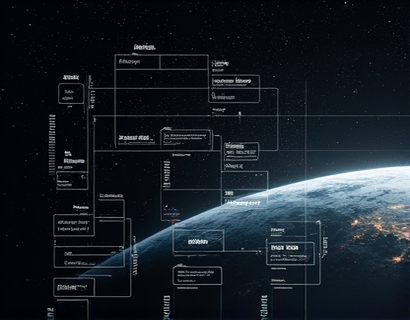Optimizing DAO Management: Advanced Software Solutions for Enhanced Governance and Analytics
In the rapidly evolving landscape of decentralized technologies, Decentralized Autonomous Organizations (DAOs) have emerged as a transformative force, offering a new paradigm for governance and management. However, the complexity and scale of DAOs necessitate sophisticated tools to ensure effective governance and analytics. Advanced software solutions play a pivotal role in optimizing DAO management, streamlining processes, enhancing collaboration, and providing actionable insights. This article delves into the critical aspects of leveraging advanced software to drive sustainable growth through transparency and data-driven decision making.
Understanding the Challenges of DAO Governance
DAOs operate on blockchain technology, which inherently brings both opportunities and challenges. One of the primary challenges is governance. Unlike traditional organizations, DAOs lack a centralized authority, making decision-making processes more complex. Ensuring that all stakeholders have a voice while maintaining efficiency and security is a significant hurdle. Additionally, the transparency required in DAOs must be balanced with the need for privacy and confidentiality in certain operations. These challenges highlight the importance of advanced software solutions that can address these issues effectively.
Streamlining Governance with Advanced Software
Advanced software solutions are designed to simplify the governance of DAOs by automating routine tasks, enhancing transparency, and facilitating better decision-making. One of the key features of these solutions is the ability to create and manage smart contracts, which are self-executing contracts with the terms directly written into code. Smart contracts automate voting processes, fund distributions, and other governance activities, reducing the risk of human error and increasing efficiency.
Another critical aspect is the implementation of decentralized governance platforms. These platforms allow for real-time tracking of proposals, voting, and outcomes, ensuring that all members have access to the same information. This transparency is crucial for building trust among stakeholders and maintaining the integrity of the DAO. Advanced software can also integrate with various blockchain networks, providing flexibility and interoperability.
Enhancing Collaboration Through Advanced Tools
Collaboration is a cornerstone of successful DAO management. Advanced software solutions facilitate seamless communication and collaboration among members, regardless of their geographical location. Features such as integrated chat systems, document sharing, and project management tools enable team members to work together efficiently. These tools help break down silos and foster a collaborative environment, which is essential for the innovative and dynamic nature of DAOs.
Moreover, advanced software can incorporate social features that encourage community engagement. Forums, polls, and discussion boards allow members to share ideas, provide feedback, and participate in the decision-making process. This level of engagement not only enhances collaboration but also ensures that the DAO remains responsive to the needs and preferences of its members.
Actionable Insights Through Advanced Analytics
Data-driven decision making is vital for the sustainable growth of DAOs. Advanced software solutions provide comprehensive analytics tools that offer insights into various aspects of DAO operations. These tools can track key performance indicators (KPIs), monitor fund flows, and analyze member activity. By leveraging these insights, DAO managers can make informed decisions that align with the organization's goals and objectives.
One of the most powerful features of advanced analytics is predictive analysis. By analyzing historical data and current trends, these tools can forecast future scenarios, helping DAOs anticipate challenges and opportunities. This proactive approach enables DAOs to stay ahead of the curve and adapt to changing conditions in the decentralized ecosystem.
Ensuring Security and Compliance
Security and compliance are paramount in the world of DAOs. Advanced software solutions incorporate robust security measures to protect the organization from potential threats. Features such as multi-factor authentication, encryption, and regular security audits ensure that sensitive data and transactions are secure. Additionally, compliance with regulatory requirements is crucial, and advanced software can help DAOs navigate the complex landscape of regulations by providing tools for compliance monitoring and reporting.
Another aspect of security is the management of private keys and wallet addresses. Advanced software can offer secure key management solutions, ensuring that private keys are stored and managed safely. This is essential for preventing unauthorized access and ensuring the integrity of the DAO's assets.
User-Friendly Interfaces for Inclusive Governance
To maximize the participation of all members, advanced software solutions must prioritize user-friendly interfaces. A intuitive and accessible platform ensures that members with varying levels of technical expertise can navigate the governance processes with ease. This inclusivity is crucial for fostering a diverse and engaged community, which is a strength of DAOs.
Moreover, multilingual support and accessibility features can further enhance the user experience, making the platform usable for a global audience. By removing barriers to participation, advanced software helps create a more democratic and inclusive governance model.
Scalability and Flexibility
As DAOs grow and evolve, their governance structures must be able to scale accordingly. Advanced software solutions are designed to be scalable, handling increasing numbers of members and transactions without compromising performance. This scalability ensures that the DAO can grow sustainably without facing technical limitations.
Flexibility is another key feature of advanced software. Different DAOs may have unique requirements and workflows, and the software should be adaptable to meet these needs. Customizable dashboards, modular components, and extensible APIs allow DAOs to tailor the platform to their specific requirements, ensuring that it remains a valuable tool for governance and management.
Case Studies and Real-World Applications
Several DAOs have successfully implemented advanced software solutions to optimize their governance and analytics. For instance, a decentralized finance (DeFi) DAO used a governance platform to streamline proposal and voting processes, resulting in faster decision-making and higher member participation. Another example is a content creation DAO that leveraged analytics tools to track engagement metrics, enabling them to refine their content strategy and increase audience reach.
These case studies demonstrate the tangible benefits of advanced software in real-world scenarios. By adopting these tools, DAOs can achieve greater efficiency, transparency, and success in their operations.
Future Trends and Innovations
The field of DAO management software is rapidly evolving, with new innovations on the horizon. One emerging trend is the integration of artificial intelligence (AI) and machine learning (ML) to enhance decision-making processes. AI can analyze vast amounts of data to identify patterns and provide recommendations, further empowering DAO managers to make informed decisions.
Another area of innovation is the development of cross-chain solutions, allowing DAOs to operate across multiple blockchain networks seamlessly. This interoperability can open up new opportunities for collaboration and growth, as DAOs can tap into the strengths of different ecosystems.
Additionally, the rise of decentralized identity (DID) solutions is set to revolutionize user authentication and privacy in DAOs. DIDs provide a secure and user-controlled way to manage digital identities, enhancing the overall security and user experience of governance platforms.
Conclusion
Optimizing DAO management through advanced software solutions is essential for achieving sustainable growth and success in the decentralized ecosystem. These tools streamline governance, enhance collaboration, and provide actionable insights, enabling DAOs to operate efficiently and transparently. By embracing these innovations, DAO managers and administrators can unlock the full potential of their organizations, fostering a dynamic and inclusive governance model that drives long-term value.










































